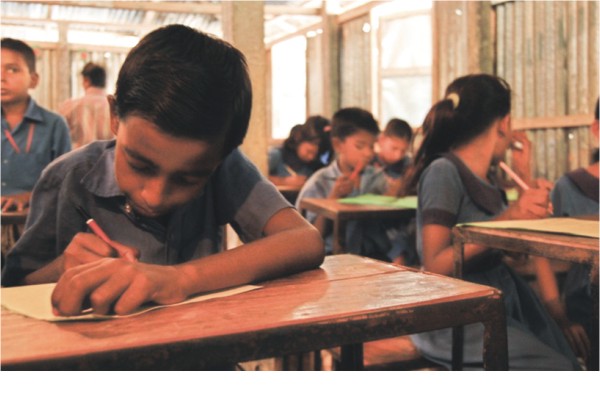Extra Credit
Can Learning Be Taught?
Sabhanaz Rashid Diya
Photos: Sabhanaz Rashid Diya
When I was in sixth grade, I met someone who without realising it consciously would change my life forever. She was my English Literature teacher, an obnoxious young lady and she made everyone's lives an unnecessary mess by asking us to do more readings than required. In her class, I came across a phenomenal book-Harper Lee's 'To Kill A Mocking Bird' that changed the way I perceived the world around me. My teacher, being obnoxious had the audacity to openly talk about issues such as sex, rape, barbarism and colonialism in class and barely regarded us as children who wouldn't understand, much less care about it. Yet, she left the deepest mark in my thoughts and her courage to do what was not proclaimed and prescribed inspired me to think differently, understand the world beyond what is seen, never be afraid of expressing myself and most importantly, to be consistently curious. To this day, I believe it is one of the greatest gifts I have received in my life and I have that obnoxious teacher to thank for it.

Do smart children only mean those with good grades or some level of community participation
or does it mean those who are not afraid to ask questions?
Many years later, as I traveled to hundreds of primary schools in the country, I kept remembering my teacher. To make learning more interactive, that somehow being synonymous to more effective, everyone in the vicinity of education development has introduced some sort of an additional, alternative learning tool inside classrooms. There were multimedia support, interactive videos, computers, mini libraries and even regular workshops and yet, the gross results at the end of each year were stagnant on higher attendance rates or swell grades. What no one noticed and what didn't change was the quality of education, or bluntly put, the quality of learning. Were students more curious? Were they eager to ask questions? Would they explicitly express themselves?
Statistics and personal interviews do show progress and there is no credit in ignoring it. Additional and alternative learning tools have helped children to a degree; they are now essentially more informed, more structured while expressing themselves and perhaps, in some cases, more courageous. But, does that make them better learners? Does it instill the spirit of self-reflection and the zeal to read, learn and unlearn as life progresses? Do smart children only mean those with good grades or some level of community participation or does it mean those who are not afraid to ask questions? Have our efforts still not been able to crack through the post-1930s pathshala and British pedagogy?

The one thing that made all the difference is the learning methodology,
or in other words,
teaching approaches.
In our research at the One Degree Initiative Foundation, we came across some intriguing realisations. We understood regardless of tools and interventions, the one thing that made all the difference is the learning methodology, or in other words, teaching approaches. An interesting teacher can set the grounds for a lifetime of curiousity, while the same content if-taught by someone less enthusiastic-would not yield the same results. It was important to break traditional moulds, ask children to ask questions, take them to the field and teach them geometry or spend a few minutes every morning in class to talk about what happened the night before. Essentially, it meant students would become better learners, and yes -learning can be taught.
How? Where do we place our interventions? Teacher recruiting process? Their trainings? The administration? The issue at hand does not have a single solution, but requires an interdisciplinary approach. It isn't limited to having a more refined teacher recruitment process, but also working with curriculums at teacher training institutes to ensure the best teaching methodologies are taught. It isn't just about the teacher, but the administration who lets some things off the grid, of decentralised governments who need not bring politics, of policy makers who understand grassroots requirements.
For now, it starts off with respect. If we could only listen to our primary school teachers speak, make sure we give them enough reason to be curious, and in turn help them trigger off our zeal to learn, classrooms can become an incredible playground of the mind. If there was one thing I learnt from my sixth grade English Language teacher, it was that greatness does not come from the masses or the community. It comes from one eager learner, one given opportunity and one small step.
|
|
|
